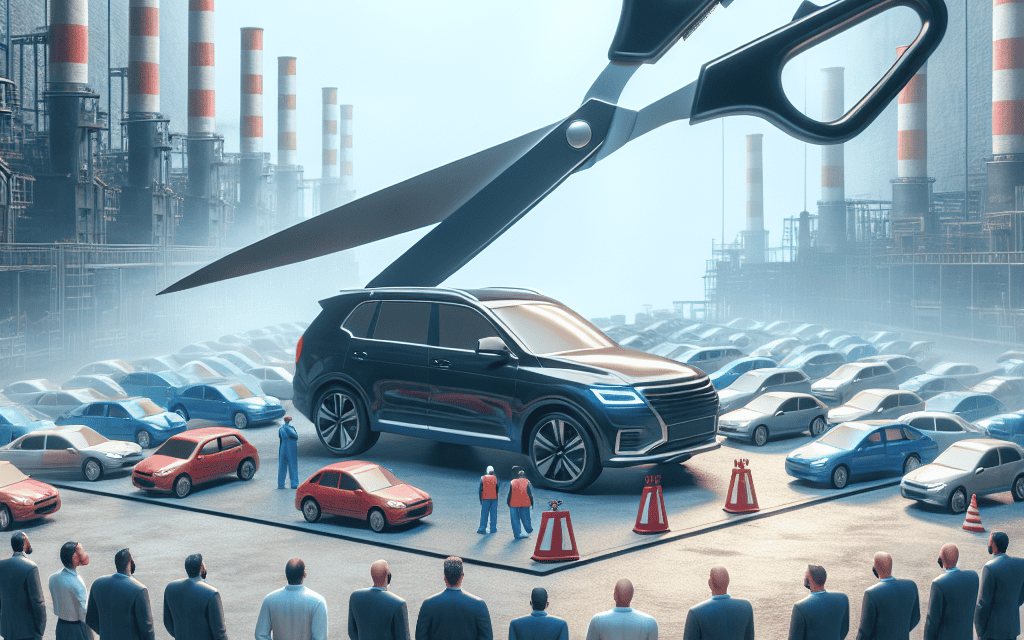“Volkswagen’s Labor Leader Warns: Safeguarding Jobs Amidst Looming Factory Shutdowns in Germany”
Introduction
Volkswagen’s labor leader has issued a stark warning regarding potential job cuts and factory shutdowns in Germany, highlighting the growing concerns within the automotive industry as it navigates economic challenges and shifts in market dynamics. The cautionary statement underscores the pressures faced by traditional car manufacturers amid the transition to electric vehicles, fluctuating demand, and global supply chain disruptions. As Volkswagen grapples with these transformative changes, the labor leader’s remarks bring attention to the delicate balance between maintaining workforce stability and adapting to the evolving landscape of the automotive sector.
Impact Of Potential Job Cuts On Volkswagen’s Workforce In Germany
Volkswagen, a cornerstone of Germany’s automotive industry, is currently facing significant challenges that could lead to potential job cuts and factory shutdowns. This development has raised concerns among employees and stakeholders alike, as the implications for the workforce could be profound. The labor leader at Volkswagen has issued a cautionary note regarding these potential changes, emphasizing the need for careful consideration of the impact on the company’s workforce in Germany.
The automotive industry is undergoing a transformative phase, driven by the shift towards electric vehicles, digitalization, and sustainability. While these changes are necessary for the industry’s future viability, they also present challenges that require strategic adjustments. Volkswagen, like many of its peers, is navigating this complex landscape, balancing the need for innovation with the imperative to maintain its workforce. The labor leader’s warning highlights the tension between these competing priorities.
In recent years, Volkswagen has made significant investments in electric vehicle technology, aiming to position itself as a leader in this burgeoning market. However, the transition from traditional internal combustion engines to electric vehicles is not without its challenges. Electric vehicles require fewer components and less labor to produce, which could lead to a reduction in the workforce. This potential reduction is a primary concern for the labor leader, who is advocating for strategies that minimize job losses while still allowing the company to remain competitive.
Moreover, the global economic environment adds another layer of complexity to Volkswagen’s situation. Supply chain disruptions, fluctuating demand, and geopolitical tensions have all contributed to an uncertain market landscape. These factors have forced Volkswagen to reassess its production strategies, which could result in factory shutdowns or reduced operations in certain locations. The labor leader’s cautionary stance underscores the need for a balanced approach that considers both economic realities and the welfare of the workforce.
The potential job cuts and factory shutdowns could have far-reaching implications for Volkswagen’s employees in Germany. The automotive sector is a significant employer in the country, and any reduction in jobs could have a ripple effect on the broader economy. The labor leader’s warning serves as a reminder of the human element at the heart of these decisions. It is crucial for Volkswagen to engage in open dialogue with its workforce, ensuring that employees are informed and involved in the decision-making process.
Furthermore, the labor leader’s cautionary note calls for proactive measures to mitigate the impact of potential job cuts. This could include retraining programs to equip employees with the skills needed for new roles within the company, as well as exploring opportunities for redeployment within Volkswagen’s extensive global network. By taking a proactive approach, Volkswagen can demonstrate its commitment to its workforce while also positioning itself for future success.
In conclusion, Volkswagen’s labor leader has issued a timely warning about the potential job cuts and factory shutdowns in Germany. As the company navigates the challenges of the evolving automotive landscape, it must balance the need for innovation with the imperative to support its workforce. By engaging in open dialogue and implementing proactive measures, Volkswagen can address these challenges while maintaining its position as a leader in the industry. The road ahead may be complex, but with careful planning and consideration, Volkswagen can emerge stronger and more resilient.
Volkswagen’s Labor Leader’s Concerns Over Factory Shutdowns
Volkswagen’s labor leader has recently voiced concerns over potential job cuts and factory shutdowns in Germany, highlighting the challenges the automotive giant faces in an increasingly competitive and rapidly evolving industry. As the global automotive landscape shifts towards electric vehicles and digitalization, traditional car manufacturers like Volkswagen are under immense pressure to adapt swiftly. This transition, while necessary for future growth and sustainability, poses significant risks to employment and operational stability, particularly in regions heavily reliant on traditional manufacturing processes.
The labor leader’s cautionary remarks come at a time when Volkswagen is navigating the complexities of transforming its production lines to accommodate electric vehicles. This shift is not merely a technological upgrade but a comprehensive overhaul of existing systems, requiring substantial investment in new technologies and workforce retraining. Consequently, the potential for job cuts looms large, as the skills required for electric vehicle production differ significantly from those needed for conventional car manufacturing. The labor leader emphasizes the importance of balancing innovation with job security, advocating for strategies that protect workers while enabling the company to remain competitive.
Moreover, the possibility of factory shutdowns in Germany adds another layer of concern. Germany, being the heart of Volkswagen’s manufacturing operations, plays a crucial role in the company’s global supply chain. Any disruption in this region could have far-reaching implications, affecting not only local economies but also Volkswagen’s ability to meet international demand. The labor leader underscores the need for careful planning and strategic decision-making to mitigate the risks associated with potential shutdowns. This involves engaging in constructive dialogue with stakeholders, including government bodies, to explore avenues for support and collaboration.
In addition to internal challenges, Volkswagen must contend with external pressures from regulatory bodies and market competitors. Stringent emissions regulations and ambitious climate goals set by the European Union necessitate a rapid transition to cleaner technologies. While Volkswagen has made significant strides in this direction, the pace of change required is unprecedented. The labor leader’s concerns reflect the broader industry sentiment that achieving these targets without compromising jobs is a formidable task. Furthermore, competition from both established automakers and new entrants in the electric vehicle market intensifies the urgency for Volkswagen to innovate and streamline its operations.
To address these multifaceted challenges, Volkswagen is exploring various strategies, including investing in research and development, forming strategic partnerships, and enhancing workforce training programs. The labor leader advocates for a proactive approach, urging the company to prioritize transparency and communication with employees. By fostering an environment of trust and collaboration, Volkswagen can navigate this transition more effectively, ensuring that its workforce remains engaged and motivated.
In conclusion, the labor leader’s cautionary stance on potential job cuts and factory shutdowns serves as a critical reminder of the delicate balance Volkswagen must maintain as it steers through this transformative period. While the shift towards electric vehicles and digitalization is imperative for long-term success, it is equally important to safeguard the livelihoods of those who have been integral to the company’s legacy. By adopting a holistic approach that considers both technological advancement and workforce welfare, Volkswagen can emerge stronger and more resilient in the face of industry challenges.
Economic Implications Of Volkswagen’s Potential Job Reductions
Volkswagen, one of the world’s leading automotive manufacturers, has recently found itself at the center of a significant debate concerning potential job cuts and factory shutdowns in Germany. This development has sparked widespread concern, not only within the company but also across the broader economic landscape. The labor leader at Volkswagen has issued a cautionary statement, highlighting the potential economic implications of such measures. As the automotive industry undergoes a transformative shift towards electric vehicles and digitalization, Volkswagen is grappling with the need to adapt while maintaining its workforce and production capabilities.
The potential job reductions and factory closures are primarily driven by the company’s strategic pivot towards electric mobility. This transition is essential for Volkswagen to remain competitive in an industry that is increasingly prioritizing sustainability and innovation. However, the shift from traditional internal combustion engines to electric vehicles necessitates a reevaluation of production processes and workforce requirements. Consequently, this has raised concerns about the future of thousands of jobs, particularly in Germany, where Volkswagen has a significant manufacturing presence.
The labor leader’s cautionary remarks underscore the delicate balance that Volkswagen must strike between embracing technological advancements and safeguarding employment. The potential job cuts could have far-reaching economic implications, not only for the affected employees but also for the communities that rely on Volkswagen’s factories as economic anchors. The ripple effects of such measures could extend to local businesses, suppliers, and service providers, thereby impacting the broader regional economy.
Moreover, the potential factory shutdowns could exacerbate existing economic challenges in Germany, particularly in regions heavily dependent on the automotive industry. The loss of manufacturing jobs could lead to increased unemployment rates, reduced consumer spending, and a decline in economic growth. This scenario presents a formidable challenge for policymakers, who must navigate the complexities of supporting both industrial innovation and employment stability.
In light of these potential economic repercussions, Volkswagen’s labor leader has called for a comprehensive dialogue between management, employees, and government officials. Such discussions are crucial to developing strategies that mitigate the adverse effects of job cuts and factory closures. Collaborative efforts could include retraining programs for affected workers, investment in new technologies, and initiatives to attract alternative industries to regions at risk of economic decline.
Furthermore, the labor leader’s cautionary stance highlights the importance of transparency and communication in navigating this transitional period. By fostering an open dialogue, Volkswagen can build trust with its workforce and stakeholders, ensuring that decisions are made with a clear understanding of their potential impact. This approach not only aligns with the company’s commitment to corporate social responsibility but also reinforces its reputation as a leader in the global automotive industry.
In conclusion, Volkswagen’s potential job cuts and factory shutdowns in Germany present a complex challenge with significant economic implications. As the company navigates the transition to electric mobility, it must carefully balance the need for innovation with the responsibility to its workforce and the communities it serves. Through collaborative dialogue and strategic planning, Volkswagen can address these challenges while positioning itself for long-term success in an evolving industry. The labor leader’s cautionary message serves as a timely reminder of the importance of thoughtful decision-making in the face of transformative change.
Strategies For Mitigating Job Losses At Volkswagen’s German Plants

Volkswagen, a cornerstone of Germany’s automotive industry, is currently navigating a complex landscape marked by rapid technological advancements and shifting market demands. The company’s labor leader has recently raised concerns about potential job cuts and factory shutdowns in Germany, highlighting the urgent need for strategic measures to mitigate these risks. As the automotive sector undergoes a transformative shift towards electric vehicles and digitalization, Volkswagen faces the dual challenge of maintaining its competitive edge while safeguarding its workforce.
To address these challenges, Volkswagen must adopt a multifaceted approach that balances innovation with job security. One potential strategy involves investing in the retraining and upskilling of its current employees. By equipping workers with the skills necessary for the evolving automotive landscape, Volkswagen can ensure that its workforce remains relevant and adaptable. This approach not only preserves jobs but also enhances the company’s ability to innovate and compete in the global market.
Moreover, Volkswagen could explore strategic partnerships and collaborations with technology firms and educational institutions. Such alliances can facilitate knowledge exchange and provide access to cutting-edge technologies, thereby enabling Volkswagen to stay ahead of industry trends. By fostering a culture of continuous learning and innovation, the company can create new opportunities for its employees and reduce the likelihood of job losses.
In addition to focusing on workforce development, Volkswagen should consider optimizing its production processes to enhance efficiency and reduce costs. Implementing advanced manufacturing technologies, such as automation and artificial intelligence, can streamline operations and improve productivity. However, it is crucial that these technological advancements are integrated thoughtfully, with a focus on complementing human labor rather than replacing it. By adopting a balanced approach, Volkswagen can achieve operational excellence while minimizing the impact on its workforce.
Furthermore, Volkswagen can explore diversification strategies to mitigate the risks associated with market fluctuations. By expanding its product portfolio and entering new markets, the company can create additional revenue streams and reduce its reliance on traditional automotive sales. This diversification can provide a buffer against economic downturns and help sustain employment levels at its German plants.
Engaging in open and transparent communication with employees and stakeholders is also essential. By fostering a dialogue with labor unions and workers, Volkswagen can build trust and ensure that any necessary changes are implemented collaboratively. This approach not only helps in addressing employee concerns but also facilitates the development of mutually beneficial solutions that align with the company’s long-term goals.
Lastly, Volkswagen should leverage government support and incentives aimed at promoting sustainable practices and job creation. By aligning its strategies with national and regional economic policies, the company can access funding and resources that support its transition towards a more sustainable and resilient business model. This alignment can also enhance Volkswagen’s reputation as a socially responsible organization committed to the well-being of its employees and the broader community.
In conclusion, while the potential for job cuts and factory shutdowns at Volkswagen’s German plants presents significant challenges, there are viable strategies to mitigate these risks. By investing in workforce development, optimizing production processes, exploring diversification opportunities, engaging in transparent communication, and leveraging government support, Volkswagen can navigate this period of transformation while safeguarding its workforce. Through these efforts, the company can continue to thrive in an increasingly competitive and dynamic automotive industry.
The Role Of Labor Unions In Volkswagen’s Employment Decisions
Volkswagen, a titan in the automotive industry, has long been a cornerstone of Germany’s economic landscape. However, recent developments have cast a shadow over its future employment strategies, as the company’s labor leader has raised concerns about potential job cuts and factory shutdowns within Germany. This situation underscores the critical role that labor unions play in shaping employment decisions at Volkswagen, a company where the balance between economic efficiency and workforce welfare is constantly negotiated.
Labor unions have historically been instrumental in advocating for workers’ rights and ensuring fair labor practices. At Volkswagen, the labor union’s influence is particularly pronounced, given the company’s unique governance structure. The Volkswagen Group operates under a co-determination model, which grants labor representatives significant sway in corporate decision-making processes. This model is designed to foster collaboration between management and employees, ensuring that the workforce has a voice in strategic decisions that affect their livelihoods.
In light of the current economic pressures facing the automotive industry, including the transition to electric vehicles and the global supply chain disruptions, Volkswagen is compelled to reassess its operational strategies. The labor leader’s cautionary remarks about potential job cuts and factory closures highlight the tension between maintaining competitiveness and safeguarding employment. As Volkswagen navigates these challenges, the labor union’s role becomes even more pivotal in mediating between the company’s financial imperatives and the workforce’s job security.
The labor union’s involvement in Volkswagen’s employment decisions is not merely reactive but also proactive. By engaging in dialogue with management, the union seeks to influence the company’s strategic direction, advocating for solutions that minimize adverse impacts on employees. This includes negotiating terms that could mitigate job losses, such as retraining programs for workers to transition into roles aligned with the company’s evolving focus on electric mobility. Furthermore, the union’s participation in decision-making processes ensures that any restructuring plans are scrutinized for their long-term implications on the workforce.
Moreover, the labor union’s advocacy extends beyond immediate employment concerns. It also encompasses broader issues such as working conditions, employee benefits, and workplace safety. By addressing these aspects, the union contributes to a more holistic approach to employment decisions, ensuring that Volkswagen’s workforce remains motivated and productive. This comprehensive involvement underscores the union’s commitment to not only preserving jobs but also enhancing the overall quality of employment at Volkswagen.
As Volkswagen contemplates its future in an increasingly competitive and technologically advanced industry, the labor union’s role is indispensable. The union acts as a counterbalance to the company’s economic objectives, ensuring that the human element is not overshadowed by financial considerations. This dynamic interplay between labor and management is crucial in navigating the complexities of modern automotive manufacturing, where technological advancements and market demands are constantly evolving.
In conclusion, the labor union at Volkswagen plays a vital role in shaping the company’s employment decisions, particularly in times of economic uncertainty. By advocating for workers’ rights and participating in strategic discussions, the union helps to ensure that Volkswagen’s operational strategies are aligned with the interests of its workforce. As the company faces potential job cuts and factory shutdowns, the union’s involvement will be key in negotiating outcomes that protect employees while allowing Volkswagen to remain competitive in a rapidly changing industry.
Volkswagen’s Future In Germany Amidst Labor Leader’s Warnings
Volkswagen, a cornerstone of Germany’s automotive industry, is currently navigating a complex landscape marked by economic challenges and evolving market demands. Recently, the company’s labor leader issued a cautionary statement regarding potential job cuts and factory shutdowns in Germany, a move that has sparked widespread concern among employees and industry observers alike. This development comes at a time when Volkswagen is striving to maintain its competitive edge while transitioning towards a more sustainable and technologically advanced future.
The labor leader’s warning underscores the delicate balance Volkswagen must strike between cost management and workforce stability. As the automotive industry undergoes a significant transformation, driven by the shift towards electric vehicles and digitalization, traditional car manufacturers like Volkswagen are compelled to adapt swiftly. This transition, while necessary for long-term viability, poses immediate challenges, particularly in terms of employment. The potential for job cuts and factory closures highlights the tension between maintaining operational efficiency and preserving the livelihoods of thousands of workers.
Moreover, the labor leader’s concerns are not unfounded. The global automotive market is experiencing unprecedented changes, with increasing competition from new entrants and tech companies. These dynamics necessitate substantial investments in research and development, as well as in the re-skilling of the workforce to meet the demands of new technologies. Consequently, Volkswagen faces the dual challenge of funding these investments while managing costs, a task made more daunting by the current economic climate characterized by inflationary pressures and supply chain disruptions.
In light of these challenges, Volkswagen’s leadership is tasked with making strategic decisions that will shape the company’s future. The potential job cuts and factory shutdowns in Germany are part of a broader effort to streamline operations and enhance efficiency. However, these measures must be carefully weighed against the potential social and economic impact on local communities and the broader German economy. The automotive sector is a significant contributor to Germany’s GDP, and any major disruptions could have far-reaching consequences.
To navigate this complex situation, Volkswagen is likely to engage in dialogue with labor unions and government officials to explore viable solutions that balance economic imperatives with social responsibility. Collaborative efforts could include initiatives to upskill workers, thereby equipping them with the competencies required for new roles within the company. Additionally, Volkswagen may consider leveraging government support programs aimed at facilitating the transition to a greener economy, which could help mitigate the impact of potential job losses.
Furthermore, Volkswagen’s commitment to sustainability and innovation remains a central pillar of its strategy. By investing in electric vehicle technology and expanding its digital capabilities, the company aims to position itself as a leader in the next generation of mobility solutions. This forward-looking approach not only aligns with global environmental goals but also presents opportunities for growth and job creation in emerging sectors.
In conclusion, Volkswagen’s labor leader’s warnings about potential job cuts and factory shutdowns in Germany highlight the complex challenges facing the automotive industry today. As Volkswagen navigates this transformative period, it must balance the need for operational efficiency with its responsibility to its workforce and the communities it serves. Through strategic planning, collaboration, and a commitment to innovation, Volkswagen can chart a course that ensures its continued success while contributing positively to the broader societal landscape.
Analyzing The Causes Behind Volkswagen’s Potential Factory Closures
Volkswagen, a cornerstone of the German automotive industry, is currently facing a period of uncertainty as its labor leader has raised concerns about potential job cuts and factory shutdowns within Germany. This development has sparked widespread attention, as it not only affects the company’s workforce but also has broader implications for the German economy. To understand the underlying causes of these potential closures, it is essential to examine the multifaceted challenges that Volkswagen is currently navigating.
Firstly, the global automotive industry is undergoing a significant transformation, driven by the shift towards electric vehicles (EVs) and sustainable mobility solutions. This transition is not only a response to increasing environmental regulations but also a strategic move to meet changing consumer preferences. However, the shift from internal combustion engines to electric powertrains requires substantial investment in new technologies and infrastructure. For Volkswagen, this means reallocating resources to develop EV capabilities, which may necessitate restructuring its existing operations. Consequently, traditional manufacturing facilities that are not easily adaptable to EV production may face downsizing or closure.
Moreover, the competitive landscape in the automotive sector is intensifying, with new entrants and established players alike vying for market share in the burgeoning EV market. Companies such as Tesla have set high benchmarks for innovation and efficiency, compelling traditional automakers like Volkswagen to accelerate their transition strategies. This competitive pressure is compounded by the need to maintain profitability while investing heavily in research and development. As a result, Volkswagen may be compelled to optimize its production processes, potentially leading to job cuts and factory closures as part of cost-saving measures.
In addition to these industry-specific challenges, Volkswagen is also contending with broader economic factors that could influence its operational decisions. The global economy is experiencing volatility due to geopolitical tensions, supply chain disruptions, and fluctuating raw material prices. These factors can impact production costs and profit margins, prompting companies to reassess their manufacturing footprints. For Volkswagen, maintaining a competitive edge in such an environment may involve consolidating operations to more cost-effective locations, which could result in the shuttering of less efficient plants in Germany.
Furthermore, the labor market dynamics in Germany present another layer of complexity. The country is known for its strong labor unions and robust worker protections, which can make workforce restructuring a challenging endeavor. Negotiations with labor representatives are often intricate and time-consuming, requiring careful consideration of employee rights and benefits. Volkswagen’s labor leader has already voiced concerns about the potential social impact of job cuts, emphasizing the need for a balanced approach that safeguards employment while ensuring the company’s long-term viability.
In light of these challenges, Volkswagen’s potential factory closures in Germany are not merely a reflection of internal corporate strategy but rather a response to a confluence of external pressures. The company’s leadership must navigate these turbulent waters with a strategic vision that aligns with both market demands and stakeholder expectations. As Volkswagen continues to adapt to the evolving automotive landscape, the decisions it makes today will undoubtedly shape its future trajectory and influence the broader industry. Therefore, stakeholders, including employees, investors, and policymakers, will be closely monitoring how Volkswagen addresses these challenges and what measures it implements to secure its position as a leader in the global automotive market.
Q&A
1. **What is the main concern of Volkswagen’s labor leader?**
The labor leader is concerned about potential job cuts and factory shutdowns in Germany.
2. **Why are job cuts being considered at Volkswagen?**
Job cuts are being considered due to financial pressures and the need to improve efficiency and competitiveness.
3. **Which factories in Germany are at risk of shutdowns?**
Specific factories have not been publicly named, but the risk is generally associated with underperforming or less efficient plants.
4. **How is the labor leader responding to these potential cuts?**
The labor leader is cautioning against the cuts and advocating for alternative solutions to preserve jobs.
5. **What alternatives are being suggested to avoid job cuts?**
Alternatives may include restructuring, investment in new technologies, or government support to maintain employment levels.
6. **How might these potential job cuts impact Volkswagen’s workforce?**
Potential job cuts could lead to significant layoffs, affecting thousands of workers and their families.
7. **What is the broader impact of these potential cuts on the German economy?**
The broader impact could include economic downturns in regions dependent on Volkswagen factories, reduced consumer spending, and increased unemployment rates.
Conclusion
Volkswagen’s labor leader has expressed concerns regarding potential job cuts and factory shutdowns in Germany, highlighting the challenges the company faces amid shifting market dynamics and the transition to electric vehicles. The cautionary stance underscores the tension between maintaining employment levels and adapting to new technological and environmental demands. This situation reflects broader industry trends where traditional automakers must balance workforce stability with the need to innovate and remain competitive in a rapidly evolving automotive landscape. The labor leader’s warning serves as a reminder of the socio-economic implications of industrial transformation and the importance of strategic planning to mitigate adverse impacts on workers and communities.





